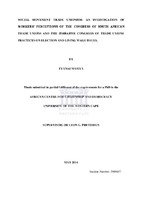Social movement trade unionism: an investigation of workers' perceptions of the South African Congress of Trade Unions and the Zimbabwe Congress of Trade Unions practices on election and living wage issues
Abstract
This study investigates workers’ perceptions of the Congress of South African Trade Unions (COSATU) and the Zimbabwe Congress of Trade Unions (ZCTU) practices on elections and living wage issues from a social movement perspective from the Apartheid (South Africa) and Unilateral Declaration of Independence (Zimbabwe) eras to 2009. The trade union social movement perspective refers to labour movements that develop a socio-political character, and concern themselves not only with workplace issues but with broad social and political issues. A study of COSATU and ZCTU practices in South Africa and Zimbabwe at this time in the field of social movements is consistent with current calls for a conceptual shift, away from looking for invariant causes and effects to looking for mechanisms and processes that occur in many different kinds of movements and that lead to different outcomes depending on the specific contexts within which they occur. The study draws insights from social movement unionsm theory to understand mechanisms and processes pursued by COSATU and ZCTU in seeking to influence policy outcomes. This study used a qualitative approach and a case study strategy. In the study, questionnaire and in-depth interview responses were drawn from COSATU secretariat, two affiliates, the South African Democratic Teachers Union (SADTU) and National Union of Mine Workers (NUM). Questionnaire and in-depth responses were also drawn from the ZCTU secretariat, two affiliates, the General Agriculture and Plantation Workers Union of Zimbabwe (GPWUZ) and the Zimbabwe Urban Municipal Workers Union (ZUMWU). The objective was to gain insights from a broad cross-section of union members – blue-collar workers, professionals, state or semi state institution workers and ordinarily low income farm workers. The study concludes that workers’ perceptions of the two labour social movements is that they can influence changes in the political system (through elections) as a means to securing living wages by engaging in five practices, namely, disruption mechanisms, public preference mechanisms, political access mechanisms, judicial mechanisms and international access mechanisms. However, while the study noted that workers perceive COSATU and ZCTU practices as essential in influencing elections and living wage issues, the popularity of the mechanisms was lower in Zimbabwe where workers often face persecution. In South Africa, utilisation of these practices is also affected by the less militant public sector affiliates and non- standard forms of work such as subcontracting, casualisation, informalisation, externalisation and the ballooning informal sector. Given these problems, social movement trade unionism remains a viable means of representing the interests of the working poor. Establishment of these challenges leads to areas of possible further research such as how the unions can effectively represent the unorganised workers of the informal sector. A broader research on the impact of the exponential growth of non-standard forms of work is also relevant at this time in the two countries.

